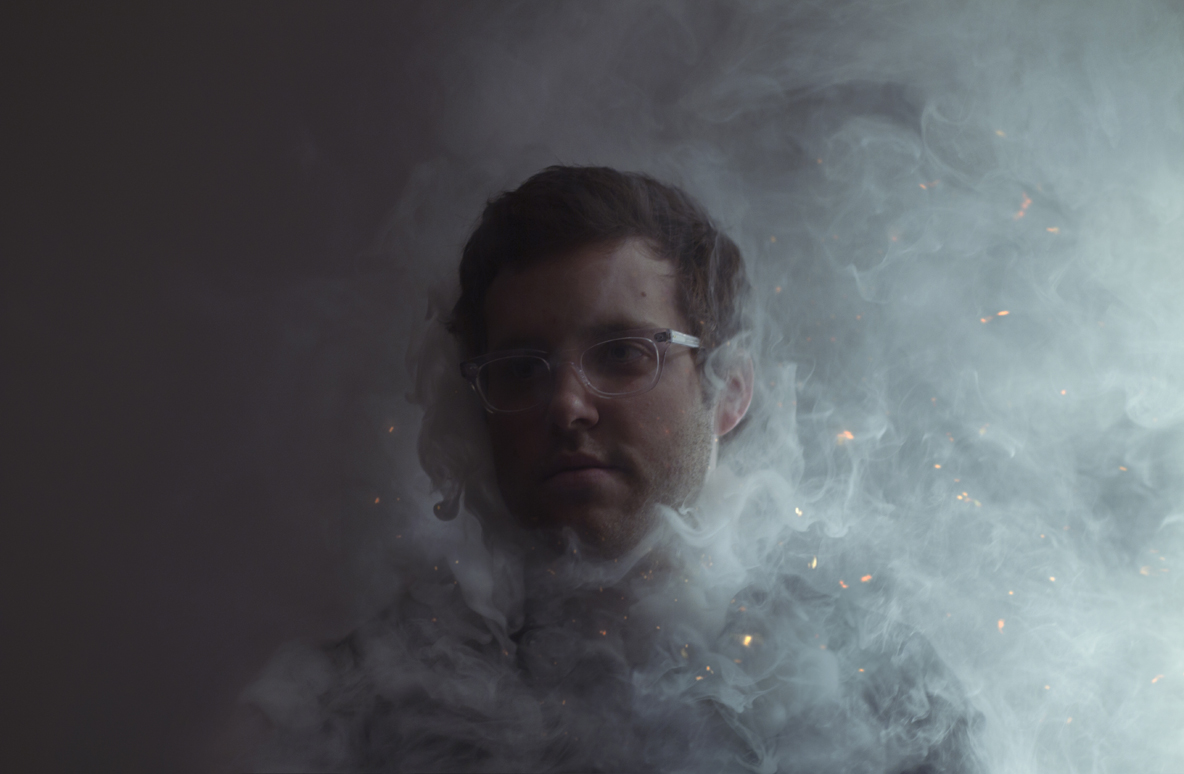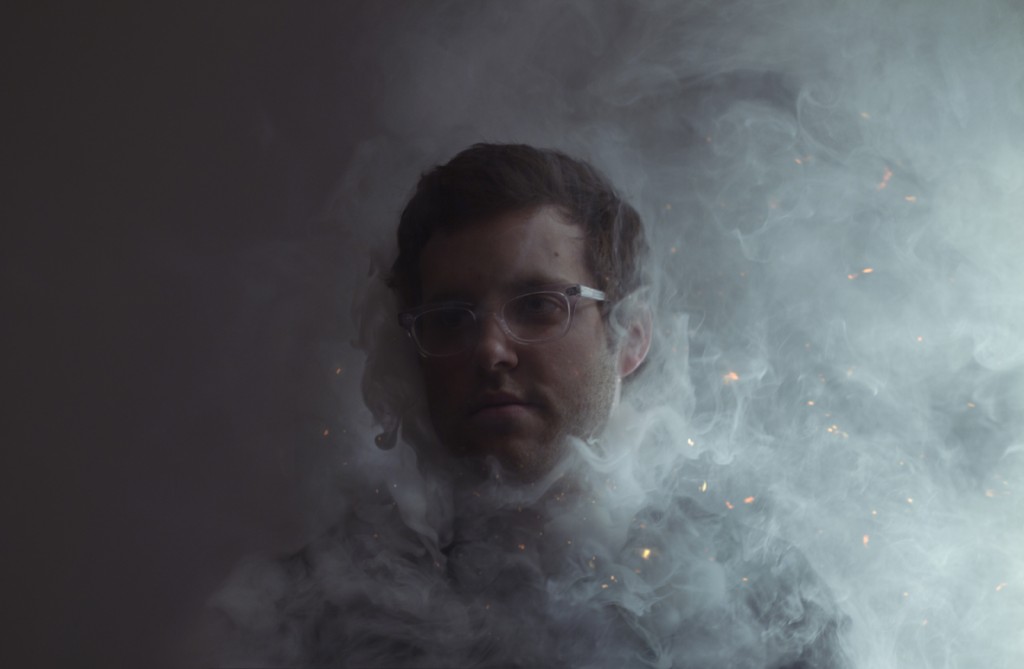“Selfishness plays a very positive role for me. I have to love it to death or I can’t remain involved with it.” So says twenty-four year old Californian electronic producer Will Wiesenfeld AKA Baths. Having developed a particularly crippling bout of E Coli in 2009 that left him bed-ridden and unable to write music for months, he positively channelled this skirmish with mortality into his second full-length release, last year’s masterfully bleak and heart-wrenchingly beautiful Obsidian. If Nietzsche’s immortal adage “That which does not kill us makes us stronger” rings true, Wiesenfeld’s sophomore effort embodied a distinctly do-or-die spirit.
With his 2008 full-length debut, Cerulean, brimming with a sun-kissed, balmy effulgence, Obsidian proved a markedly more brooding and inward-looking release. From the wonderfully ruminating ‘Ossuary’ to the plundering electronica of ‘Earth Death’, a looming shadow lingers over skittering, sunlit activity. Did Wiesenfeld consciously attempt to capture and distil the innate light and beauty in his otherwise dark and introspective concoctions? “Maybe in some ways, yeah,” he says. “But as much as I had to force darker emotions in the lyrics I didn’t force the emotion in the music – it always comes naturally. I think the contrast was less intentional.”
Melding emotive vocal lines and skittering, intricate electronica beats with carefully-composed piano and synth lines, Obsidian flows with an unobtrusive insularity that ensures each listen doubles up as a quasi-voyeuristic confrontation with one man waxing melancholic. “I am normally a pretty emotive person,” says Wiesenfeld, “so it was surreal to feel nothing for such an extended period of time – about four months. That absence of feeling became a major lyrical focus for the record after that point, whereas before it had been more focused on death. My experience was less a brush with mortality and more my first real experience with apathy.”
Such was a confrontation that extended to Ocean Death, an equally exquisite follow-up EP that Wiesenfeld sums up as “a number of pop songs about apathy and death”. Although employing a markedly “looser recording process than the rigidity and academia” of his second full-length, the ties to the latter were unavoidable. “The atmosphere and lyrical content on Ocean Death remains as dark as Obsidian”, he says. “Some of the songs were made around the same time it was made and rightfully share the same feels, but they were more unfinished and didn’t fit in properly with the Obsidian in my head, so it was cool to let them have their own release. Ocean Death is a bookend to the Obsidian era,” he continues. “I’ve always liked thinking about releasing music on those terms, that you have these small eras of releases and tours and press photos and all of that with a full-length release at the centre holding everything together.”
And quite the bookend it proved to be. Two months on from the release of Ocean Death (an EP that Wiesenfeld insists is an “accompaniment” to the towering Obsidian) he has once more leapt far beyond the aforementioned tangle with apathy – and the overtly moribund disposition of his recent material – by rebooting his side-project as Geotic. The first in a series of one-instrument releases, Morning Shore is a wholly guitar-centric affair; twelve meditative tracks that go some distance to underscore Wiesenfeld’s hunger to express himself in different ways, under different nominal guises. His is evidently an altogether restless talent not concerned with reiteration.
All but unable to do anything on a day-to-day basis, Wiesenfeld’s points of reference for the inner narratives and ideas for his Obsidian materialised firmly within the realm of the imagination – namely gaming and selected reading. “I immersed myself in the likes of Silent Hill 2, Fatal Frame 2, Limbo and Skyrim,” he says. “I read Dante’s Inferno and a great deal of this book, A Silent Mirror, for a section that depicted day-to-day life during the Dark Ages – which was a big inspiration for the record. I watched a number of horror films, spent time alone – all of the easy route ‘introspective’ sorts of things.” Thus the thematic backbone of Obsidian, coupled with Wiesenfeld’s own ever-increasing curiousity as to the cruel nature of morality, was born.
Of course, music – including sounds created close to home – also played its part in the large pool of influence from which Wiesenfeld later drew upon. “Most of the music I am attracted to and obsess over is melancholic,” he says. “My bandmate Morgan’s music under the moniker Azeda Booth was a particularly huge inspiration, but I was also really into Emptyset around the same time. I was taking a lot of inspiration from other sources though.” Rather than manifesting itself as an all-consuming nightfall that pervades the course of Obsidian this gamut of influence resulted in equally sanguine forms; the musically buoyant ‘Ironworks’, ‘Ossuary’ and ‘Phadra’ equally distilling Wiesenfeld’s masterful command of sorrow and hope in unison.
Not unlike fellow forward-moving artistes such as Hauschka and Dan Deacon, Wiesenfeld’s songwriting is naturally informed by his early classical training. With violin, cello and piano thoroughly enhancing the emotive import of its material, did his musical background play a sizable role in the songwriting process for Obsidian? “More than I expected to,” he admits, enthused, “I was just happy that when it came time for it, my hands would actually play what I wanted them to – with a bit of practice. It’s not like I have classical-tier ideas running through my head at all times, or ever really, but I’m extremely grateful for the training. The weird little flourishes and faster notes I get excited about in music I’m actually able to create myself.”
As is only to be expected, with an undeniably contrasting air to the cheerful Cerulean, Wiesenfeld fares cautious when it comes to the reaction to his recent material. With his fans’ latent reception in mind, how does he think he fundamentally evolved as a songwriter during the interim period between studio albums? “It’d be difficult for me to gauge myself,” he admits, “but I think the writing is different and I spent a great deal more time on it, so I guess it feels more mature. To be honest, though, I actually expected to lose a number of fans with this new record – the material being as dark as it is.” Needless to say, however, the vast majority of those already smitten by Wiesenfeld’s more classically “upbeat” material seem to immediately gauge the innate beauty strewn throughout Obsidian and Ocean Death.”I’d be lying if I said didn’t care if people like my stuff,” he adds. “The thing is though that I made up my mind a long time ago that I only make music for myself. The second I start to make music to cater to someone else’s requests or feelings, I stop being honest with myself and the music stops being honest”. Brian Coney






